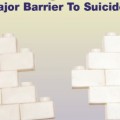
On Sunday night, Oprah’s network OWN, aired ‘Running From Crazy‘, a documentary examining the personal journey of, Mariel Hemingway, the granddaughter of Ernest Hemingway, as she strives for a greater understanding of her family history of suicide and mental illness. As a survivor, I relate to Mariel’s overwhelming fear that has guided her on her quest to lead a life of purpose. A quest to ensure that the ending to her story does not mirror those she has lost to suicide. It is a reality that only a survivor truly understands. After you lose a loved one to suicide a new fear ignites within as you begin to question, “Is this my fate?”
In August of last year, I had the pleasure of speaking on WBEZ’s Afternoon Shift as we discussed whether suicide is under-discussed in our society (Click here to hear the interview). During the interview, discussion went into the theory that suicide is genetic. The interview questioned whether a family member is more likely to take their life if they have lost a loved one to suicide. Is suicide contagious? Plain and simple, no. There is no genetic component linked to suicide. However, there is a strong genetic component that is often not discussed within families, and that is mental illness. As we all know, mental illness, just like any other medical condition, is genetic. Therefore, if your loved one suffered from depression, you are more vulnerable to suffer from depression as well. Does having a loved one with depression make you more vulnerable?
Mental illness continues to be a stigmatized topic of discussion, and a topic that is often linked to “going crazy.” Society rarely views mental illness as everyday anxiety, depression, or grief. Instead, we link mental illness to the extreme cases, such as Bipolar Disorder or Schizophrenia. We do not label ourselves as “mentally ill” even if we are taking medication to decrease everyday anxiety or depressive symptoms. What type of person do you picture when the description “mentally ill” is placed in their description? Is it the homeless person on the corner babbling to themselves? Or a man or women responding to voices in their head? I can tell you what I think of when I hear the term “mentally ill.” I think of my father. I think of my friends who experience anxiety from the overwhelming pressures of life. I think of the mother who just gave birth, sleep deprived, hormones all over the place, leading her to feel as if she is “going crazy.” I think about the person who just lost a loved one who is experiencing overwhelming grief that has led to depression. I think about the individual who just returned from war, who can’t sleep at night out of fear of what they will see in the dreams. That is what I think of when I hear “mentally ill.” It is the everyday person experiencing the stress that life can bring.
When we talk to our children, mental illness, is often not a topic of discussion. Towards the end of the documentary, Mariel’s daughter expresses her gratitude for her mother’s willingness to share her family’s history of mental illness and suicide. Mariel notes to her daughter that she never wanted it “to be a burden” to her daughter. Mariel’s daughter expresses the importance of knowing about her history and I couldn’t agree with her more.
I know that both of my grandmothers were diagnosed with breast cancer, which makes me more vulnerable to the disease. I know that my grandfather had heart disease and diabetes. I know that my mother has osteoporosis, which motivates me to take my calcium vitamins on a daily basis. What I don’t know is my family’s history of mental illness. When my father took his life I was made aware that my great uncle, my dad’s uncle, took his life as well. Nobody in our family ever talked about it, and there are few people alive who can provide me with any details. Although it is not apparent, I would assume that he too suffered with depression. So like breast cancer, heart disease, diabetes, and osteoporosis, depression runs in my family.
My daughter is eight months old and the fear of anything bad ever happening to her is overwhelming. I want to protect her from everything bad in this world. To her, the world is such an amazing place. Re-experiencing life through her eyes has been the greatest gift that God has given me. However, when I speak with her about our family’s medical history, I will also include our history of mental illness. Not to burden her, but let her know that mental illness is much more than the media portrays. To let her know, that sadness is a normal part of life, and it does not mean you are “crazy.” I will validate her feelings and the feelings of those that I love. Because sometimes all we need is a little validation. Not someone to tell us, “It could be worse.” Maybe if my father would have felt validated, he would not have taken his life. This is an answer that I will never know. In the meantime, I will continue to honor his memory by working to end the stigma surrounding mental illness. I challenge you all today to think about mental illness and what it means to you. What comes to mind when you hear the term “mentally ill?”




This is a good article. Thank you for being aware of those left behind after a suicide as well as the awareness and resources and upport needed. We have an organization Survivors of Suicide Loss – Remembering Nicholas http://rememberingnicholas.ca We have produced some videos that are on You Tube free for all. I have written some articles also on line for survivors of suicide loss. Its important to keep talking so the understanding is “No Shame, No Guilt, No Secrecy” Lets help each other unconditional. I am here if i can do anything to help get the message out! i am posting your blog with this story on my facebook, LinkedIn and twitter and I hope you dont mind? Thanks again Penny.
Thank you Penny! Please do pass along our blog. Thank you as well for bringing further awareness to a topic that is under-discussed in society! We too will pass along your organization.
I love that you included the term “validation. ”
My grandmother, mother and sister all had some for of depression, bipolar, mental illness and its inconclusive that suicide was the ultimate cause of deaths but I know, we know; validating an emotion is sometimes EVERYTHING. One of my late mothers favorite movies was What dreams may come. But not for the suicide content, for the beautiful imagery and message that sometimes all anyone wants, nay needs, is to be joined not fixed.
How different this world would be if we spent more time validating each other. At the end of the day, we all just want to be understood.